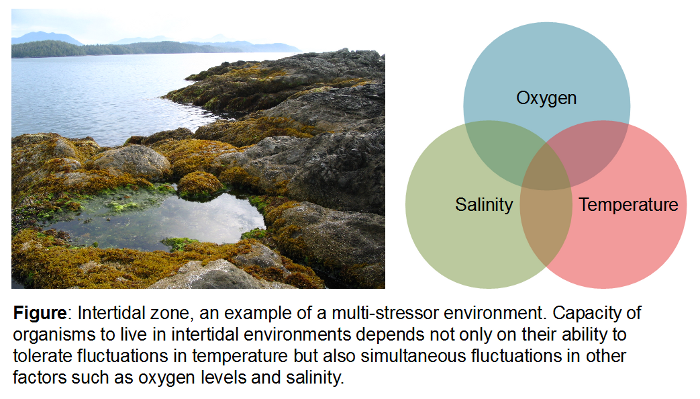SICB Annual Meeting 2013
January 3-7, 2013
San Francisco, CA
Symposium: Physiological Responses to Simultaneous Shifts in Multiple Environmental Stressors: Relevance in a Changing World

Understanding the impacts of global change on the distribution and abundance of organisms in the context of the natural environment is at the forefront of integrative organismal biology. Environmental physiologists and physiological ecologists interested in understanding how the distribution of organisms will be impacted by biotic and abiotic habitat changes have long used carefully controlled laboratory experiments that manipulate a single environmental variable (e.g., temperature) to determine some aspect of organismal performance (e.g., temperature sensitivity (Q10), tolerance maxima (CTmax)). The majority of studies done by physiologists examine one environmental variable at a time, yet in nature organisms are simultaneously exposed to multiple types of environmental variables, including stressors that may affect different physiological systems. Whether those multiple shifts in environmental variables have an additive, an antagonistic or a non-linear synergistic effect on performance is a critical issue to understand in order to properly link ecological range shifts to environmental stressor changes. If effects are additive, then small shifts in multiple stressors can still have a small effect on performance, whereas if effects are synergistic, then small shifts in multiple stressors could have a large impact on physiological performance and cause unpredictable responses in terms of species distribution and abundance. In this symposium our goal is to establish a foundation for the future of environmental physiological studies that are performed in the context of a multivariate set of environmental changes, and that may produce outcomes that allow increased precision of the predicted ecological consequences of global change.
Sponsors: NSF 
SICB Divisions: DCPB, DEE, DIZ
Organizers
- Anne Todgham, Department of Biology, San Francisco State University
- Jonathon Stillman, Romberg Tiburon Center and Department of Biology, San Francisco State University, Tiburon CA, Department of Integrative Biology, University of California Berkeley.
Speakers
S9-1.1 Monday, Jan. 7, 08:00 SINCLAIR, BJ*; MACMILLAN, HA; FERGUSON, LV; SALEHIPOUR, G:
Cross-tolerance and cross-talk in the cold: relationships between low temperature and other stressors in insects
S9-1.2 Monday, Jan. 7, 08:30 KLOK, CJ*; HARRISON, JF:
Interactions between temperature and oxygen and the evolution of body size in invertebrates
S9-1.3 Monday, Jan. 7, 09:00 BUCKLEY, Lauren B.:
Body temperatures along altitudinal and latitudinal gradients: interactions between phenotypes and multiple environmental stressors
S9-1.4 Monday, Jan. 7, 09:30 BYRNE, M:
Impacts of warming and ocean acidification on growth of larval and juvenile sea urchins – from the poles to the tropics
S9-1.5 Monday, Jan. 7, 10:30 TODGHAM, AE*; STILLMAN, JH:
Expect the unexpected: vignettes from multistressor studies that explore global change responses of a range of marine and freshwater organisms.
S9-1.6 Monday, Jan. 7, 11:00 SOKOLOVA, Inna:
Energy homeostasis as a tool to integrate the effects of multiple stressors in animals
S9-1.7 Monday, Jan. 7, 11:30 HOFMANN, Gretchen/E:
Physiological response and local adaptation of marine invertebrates to natural variation in the ocean acidification seascape
S9-2.1 Monday, Jan. 7, 13:00 VERBERK, W.C.E.P.*; BILTON, D.T.; CALOSI, P.; SPICER, J.I.:
How oxygen and temperature changes across latitude and elevation determine ecological distribution patterns
S9-2.2 Monday, Jan. 7, 13:30 FANGUE, Nann A; HASENBEIN, Matthias; KOMOROSKE, Lisa; CONNON, Richard E*:
Physiological and behavioral responses to multiple environmental stressors in San Francisco Bay-Delta fishes: linking mechanism to management
S9-2.3 Monday, Jan. 7, 14:00 WHITEHEAD, A.*; PILCHER, W.; MAYER, G.; DUBANSKY, B.; GALVEZ, F.:
Integrative biological footprint of the Deepwater Horizon oil spill in the laboratory and field
S9-2.4 Monday, Jan. 7, 14:30 SCHULTE, PM:
Evolution of tolerance to multiple interacting stressors in fish

